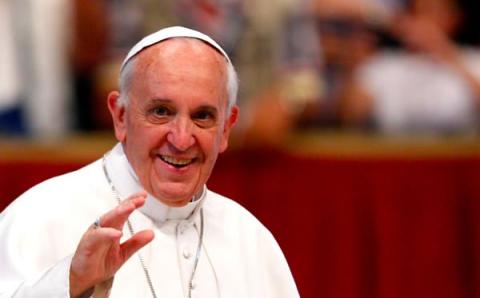Exhortation of Pope Francis (full transcript below) has focused on his direct condemnation of pure "trickle-down" economics and the need for a more inclusive religious institution.
But in all the media coverage, the only bulletins in his 50,000 word directed directly at the Fourth Estate, lawmakers, and religious leaders making most of the commentary on his message seem to be largely ignored.
On page 30 of his 224 page exhortation, Pope Francis recognizes that the modes of today's communications and the means by which we use them in a "biased media" coverage focuses on "secondary aspects," which causes us to lose meaning, and prevents the audience from fully understanding.
If we attempt to put all things in a missionary key, this will also affect the way we communicate the message. In today’s world of instant communication and occasionally biased media coverage, the message we preach runs a greater risk of being distorted or reduced to some of its secondary aspects. In this way certain issues which are part of the Church’s moral teaching are taken out of the context which gives them their meaning. The biggest problem is when the message we preach then seems identified with those secondary aspects which, important as they are, do not in and of themselves convey the heart of Christ’s message. We need to be realistic and not assume that our audience understands the full background to what we are saying, or is capable of relating what we say to the very heart of the Gospel which gives it meaning, beauty and attractiveness.
On page 153, Pope Francis recognizes the need for us to understand those who differ, without judging them.
One who accompanies others has to realize that each person’s situation before God and their life in grace are mysteries which no one can fully know from without. The Gospel tells us to correct others and to help them to grow on the basis of a recognition of the objective evil of their actions (cf. Mt 18:15), but without making judgments about their responsibility and culpability (cf. Mt 7:1; Lk 6:37).
On page 169, the Pope calls on responsible citizens to participate in political life as a moral obligation.
People in every nation enhance the social dimension of their lives by acting as committed and responsible citizens, not as a mob swayed by the powers that be. Let us not forget that “responsible citizenship is a virtue, and participation in political life is a moral obligation”. Yet becoming a people demands something more. It is an ongoing process in which every new generation must take part: a slow and arduous effort calling for a desire for integration and a willingness to achieve this through the growth of a peaceful and multifaceted culture of encounter.
Perhaps, suggests the Pope, this is the only way to wrestle our political discourse from the ideologues who look at the world through their simplified lens.
Ideas – conceptual elaborations – are at the service of communication, understanding, and praxis. Ideas disconnected from realities give rise to ineffectual forms of idealism and nominalism, capable at most of classifying and defining, but certainly not calling to action. What calls us to action are realities illuminated by reason. Formal nominalism has to give way to harmonious objectivity. Otherwise, the truth is manipulated, cosmetics take the place of real care for our bodies. We have politicians – and even religious leaders – who wonder why people do not understand and follow them, since their proposals are so clear and logical. Perhaps it is because they are stuck in the realm of pure ideas and end up reducing politics or faith to rhetoric. Others have left simplicity behind and have imported a rationality foreign to most people.
Whatever you think of the Pope, whatever you think of the church, and whatever you've taken from the news coverage, it is hard to argue with a belief that we have to talk to one another, understand one another, and be engaged with one another if we are to move forward. That has been a guiding principle at IVN and is the basis of IVN's Etiquette. We hope those of all political, religious, and philosophical persuasions join the Pope, and growing community on IVN.us, who see value in real conversation.
Read the Full Exhortation Transcript from Pope Francis
Pope Francis's Nov. 24, 2013, Evangelii Gaudium by The Washington Post
